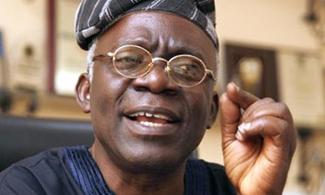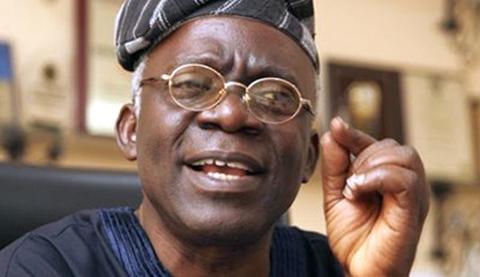
Falana stated this on Tuesday in a paper titled ‘Sentencing Rich And Poor Convicts In Nigeria: An Unbalanced Scale’, delivered as the Inaugural Public Lecture of Department of Public and International Law, Faculty of Law, Ajayi Crowther University, Oyo, Oyo State, according to a statement by Tayo Soyemi of the Falana and Falana Chambers.
Human rights lawyer, Femi Falana (SAN), says the justice system in Nigeria is constantly manipulated to favour influential politicians facing corruption charges in Nigeria.
Falana stated this on Tuesday in a paper titled ‘Sentencing Rich And Poor Convicts In Nigeria: An Unbalanced Scale’, delivered as the Inaugural Public Lecture of Department of Public and International Law, Faculty of Law, Ajayi Crowther University, Oyo, Oyo State, according to a statement by Tayo Soyemi of the Falana and Falana Chambers.

He condemned the impunity in some quarters which has caused rich and influential people to become ‘untouchable’ while the poor and underprivileged suffer for those crimes.
He said, “Since they have the money, they can influence and manipulate the justice system in their favour. Consequently, such persons commit crimes and get away with them. Owing to corruption and abysmally compromised system, they could even have the backing of the government.”
According to him, some persons who were arrested for crimes, have been convicted, sentenced and jailed but have never been found in any correctional centre while unemployed young people serve prison terms in lieu of rich convicts.
He also condemned the involvement of the government in cases involving the rich. “For political reasons, the trial and conviction of the rich are often interfered with," he said.
Falana noted: “Judges could even be coerced into favouring those rich offenders against their own will. But there is often no one to speak for the poor, who often have no voice of their own. On the few occasions that the rich are convicted, they are usually granted pardon by the President and State Governors."
He also described corruption as a major factor against the fair administration of justice in Nigeria. “Oftentimes, rich Defendants engage in dilatory tactics which frustrate and compel the state to enter into plea bargain with them.”
“Judges award lighter sentences to convicted rich defendants or resort to technicalities to free them. Otherwise, how could someone that embezzled pension funds worth billions of Naira be sentenced to only six months imprisonment, but another who stole a cheap telephone handset be sentenced to ten years imprisonment?”
Falana decried the increased injustice against poor people as more attention is being paid to cases involving the rich as opposed to the poor.
The lawyer highlighted cases of plea bargains including that of Tafa Balogun, the former Inspector General of Police who was involved in the N17 billion saga; former Governor of Bayelsa State, Dieprieye Alamiesiegha; Lucky Igbinedon, the former Governor of Edo State who was fined the sum of N3.5 million after he had entered into a plea bargain with EFCC to reduce the 191 counts against him to just a single count.
He also cited the case of John Yusuf who embezzled N27.2 billion pension fund of retired police officers; Mrs. Cecilia Ibru, the former Chief Executive Officer and Managing Director of Oceanic Bank Plc.
He added: “The case of FRN v. Abdulrasheed Maina is one of the few that made a little difference: Maina who was charged with criminal offences, punishable under sections 11(2) (a), 15(3), and 16(2) (c) of the Money Laundering Prohibition Act, and also acted in breach of the Advance Fee Fraud Act, was in November 2021 convicted and sentenced to eight years imprisonment, after being found guilty on all the 12-count charge the Economic and Financial Crimes Commission (EFCC) preferred against him and his company, Common Input Property and Investment Limited.
“The Court ordered Maina and his firm to forfeit about N2.1 billion that was traced to their bank accounts, as well as another sum of $223, 396, 30, to the Federal Government, after which he directed that the company should be wound up. It also ordered the forfeiture of Maina’s two choice properties at Life camp and Jabi districts of Abuja, to the government, likewise the auction of a bulletproof car and a BMW 5 Series exotic car that was found in premises of the convict.”
He added: “Between 2005 and 2006, a panel of enquiry instituted by the Federal Government found that 197 defendants who were tried, convicted and jailed for drug trafficking were not found in any correctional centre in the country.
“At the end of their trials, members of a syndicate made of prosecution and defence lawyers, court clerks and warders collected heavy bribes from the convicts and allowed them to escape imprisonment.
“It was found that the convicts returned to the nefarious business. I took up the matter with the Authorities of the NDLEA who assured me that the convicts would be arrested and made to serve the prison terms. But that was the end of the story.
“On July 10, 2015, the then Chief Judge of Anambra State, the Honourable Justice Umeadi visited all prisons in the State for the purpose of jail delivery to decongest the prisons. His Lordship disclosed that some prison inmates have no records in the prisons. The scandal was well reported at the material time.
“Since inmates are committed to prisons by warrants issued by Judges and Magistrates, the authorities of the Correctional Centre are challenged to explain who authorised the 'imprisonment' of inmates without records.
“Awaiting trial inmates constitute not less than 75 per cent of the prison population in the country. The majority of the inmates including convicts are poor people. The few rich people and members of the ruling class that are jailed are usually granted pardons by the President and State Governors in the exercise of their powers under section 175 of the Constitution.
“Based on the recommendation of President Muhammadu Buhari, the Council of State has just approved the pardon of a number of convicted persons including two former state governors that were jailed for laundering billions of Naira.
“Since the Constitution provides for equality of all citizens before the law, all other persons convicted for stealing, fraud and money laundering ought to be pardoned and freed.
“There can be no moral or legal justification for jailing poor people who steal spaghetti and noodles to feed their family members while those who loot the treasury are granted clemency or pardon.
“In conclusion, permit me to call on the poor who constitute the majority of poor victims of the institutionalized criminal justice system to unite and fight for socioeconomic justice and equality before the law.
“In particular, indigent accused persons are advised to brief lawyers in the Legal Aid Council and the Office of the Public defender in every state of the Federation to provide them with legal practitioner whenever they are arrested, detained or charged with any criminal offence.
“It is the responsibility of the State to assign lawyers, free of charge, to citizens who earn less than the national minimum wage of N30,000.00.
“The law is not neutral in a class society. It is made and enacted by rich legislators to serve the interests of the rich. The judges interpret the law to favour the rich and powerful people in society.
“The big lawyers hired to defend the rich exploit loopholes and technicalities in the law to free their rich clients. Hence, the poor man who stole noodles in Abuja to feed himself was jailed by an upper area court. Even though he had no more to feed himself the judge sentenced him to 6 months imprisonment or N20,000 fine.
“But the former top public officer who laundered $9.8 million and £74,000 has been set free by the Federal High Court. The Judge blamed the EFCC for not proving the case beyond reasonable doubt!
“The disparity in the sentencing of rich and poor convicts in Nigeria is one of the negative factors affecting the administration of criminal justice in the country. The main factor behind this problem is the dysfunctional justice system operated by the Nigerian courts.
“Owing to the class character of the society, the courts and law enforcement agencies tend to favour rich convicts against poor convicts. This problem has caused the public to lose hope and trust in the country’s judicial system.
“Drastic major steps must be taken to address the issue of disparity in sentencing, to ensure justice, fairness, and equality before the law, for all convicts.”